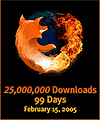
Well, I saw The Incredibles yesterday, and, well, I just wasn’t blown away.
I expected to be blown away, and that’s part of the let-down. If you’re expecting steak and get hamburger, the meal’s a letdown, now matter how good that burger is.
I had the same experience with National Lampoon’s Animal House: I first saw this when I was in college, on campus, and the college had a pretty high-profile frat presence (so, for example, there were lots of togas in the audience). But after hearing all about it, enduring food fights in the cafeteria and so on, how could the movie live up to the expectations? It couldn’t. I liked the movie, but wasn’t blown away.
Today, however, it’s one of my (guilty pleasures) favorites.
Other factors prevented me from saying “This is the damn best thing ever!” about The Incredibles:
- I’m not a big fan of superhero movies: This is a superhero movie, and that’s just not my favorite genre. I never read the comic books or watched many of the cartoons as a kid; as an adult, I’ve still yet to see any of the Batman movies, and I’ve only seen bits and pieces of the first Superman movie on TV (and was unimpressed). Just not my bag.
- The animation “wow” effect not in evidence: This is not a knock against the movie, just a simple fact. When Toy Story first came out, that was a “wow” (and it had a good story, as well). And Shrek (the first) was the first movie I ever saw on DVD, so there’s that. I still remember the first song I ever heard on CD – Aaron Copland’s “Fanfare for the Common Man” – man, that still blows me away. You really do remember your first time…
- Crappy Extras: Again, Shrek is the winner here. The entire disk of extras on The Incredibles were, for the most part, yawn-inducing. I was quite surprised.
But don’t get me wrong – the movie was fun to watch and I recommend it. It just didn’t measure up to my expectations in many ways, but that’s my problem, ya know?
Hmm…a steak does sound good…

 American IV: The Man Comes Around
American IV: The Man Comes Around


